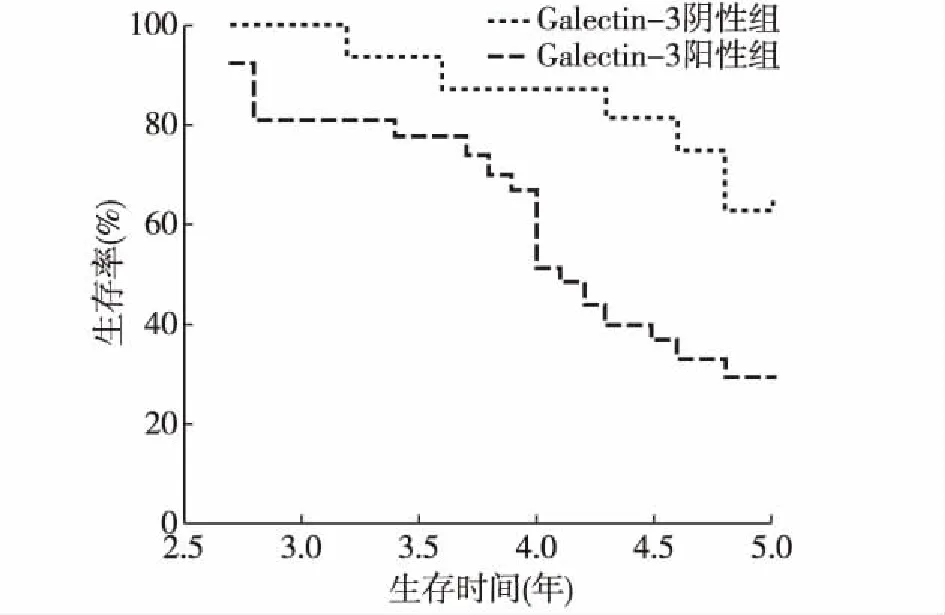老年结肠癌病人循环与肿瘤组织中Galectin-3水平及临床意义
2017-03-01任丽丽耿建
任丽丽 耿建
老年结肠癌病人循环与肿瘤组织中Galectin-3水平及临床意义
任丽丽 耿建
目的 分析老年结肠癌病人循环和肿瘤组织中半乳糖凝集素-3(Galectin-3)表达情况,以及与病人一般情况、肿瘤分期及预后的关系。 方法 收集自1999年3月至2010年12月在我科住院明确诊断的老年结肠癌病人68例,另收集50例健康体检者为对照组,测定其循环中Galectin-3水平。收集病人临床信息与实验室检查结果,采用双抗体夹心法测定循环Galectin-3水平,切除的肿瘤组织行抗Galectin-3免疫组化染色。将循环Galectin-3水平和肿瘤组织Galectin-3表达情况与病人相关资料行相关分析。 结果 68例老年结肠癌病人循环Galectin-3水平显著高于对照组(P<0.001);循环Galectin-3水平与肿瘤长径、肿瘤转移、TNM分期及预后无相关性(P>0.05);肿瘤组织Galectin-3表达阳性病例与阴性病例在血清CEA水平、肿瘤长径、Duke 分期、TNM分期、淋巴结转移、远处转移、生存时间方面差异均有统计学意义(P均<0.01)。 结论 老年结肠癌病人循环Galectin-3水平显著升高,肿瘤组织Galectin-3表达情况可预示病情和预后。
老年人; 结肠癌; 半乳糖凝集素-3; 预后
结肠癌是临床常见的恶性肿瘤,居全球恶性肿瘤发病率第3位,每年新增恶性肿瘤病人中,结肠癌约占10%[1-2]。肿瘤细胞播散和转移直接影响着结肠癌的预后,而肿瘤细胞与血管内皮细胞之间的黏附又是肿瘤浸润的关键环节。近年来,一类与细胞黏附过程有关的凝集素(Lectin)家族成员半乳糖凝集素-3(Galectin-3)引起临床关注。Galectin-3是一种对含β-半乳糖苷残基的糖化合物具有很高亲和力的凝集素,在激活的巨噬细胞中高表达,通过一种类似细胞胞吐的机制转移至细胞外并进入全身循环[3]。研究发现,多种恶性肿瘤组织中可检测出Galectin-3高表达,其中包括结肠癌[4-5]。Galectin-3在细胞增殖和分化、细胞与间质间黏附、炎症反应、血管生成、细胞凋亡、免疫调节及肿瘤浸润等方面具有广泛的生理和病理意义[6-7]。目前,以老年结肠癌病人为研究对象,同步分析循环中Galectin-3水平和肿瘤组织Galectin-3表达情况的临床研究仍有限。本研究旨在研究循环与肿瘤组织中Galectin-3表达水平在老年结肠癌病人中的临床意义。
1 对象与方法
1.1 研究对象 病例选自1999年3月至2010年12月在我科住院明确诊断的结肠癌病人68例,年龄≥60岁。排除标准:肾功能不全、严重心功能不全(NYHA分级Ⅲ~Ⅳ级)、合并恶性肿瘤、严重肥胖或消瘦(体质量指数>30或<18)。68例病人中,男43例(63%),女25例(37%),年龄60~73岁,平均(62.4±3.2)岁,Duke分期:A期18例(26.4%)、B期22例(32.3%)、C期19例(27.9%)和D期9例(13.4%);TNM分期1期23例(34.0%)、2期25例(36.7%)、3期14例(20.5%)、4期6例(8.8%)。另收集50例健康体检者作为对照组,测定其循环中Galectin-3水平。所有研究对象均签署书面知情同意书,本研究通过所在机构医学伦理审查。
1.2 研究方法 所有病人均接受手术切除病灶或探查。收集病人临床资料,包括年龄、性别、Duke分期、TNM 分期、肿瘤体积、肿瘤分化程度、转移情况,检测血清癌胚抗原(CEA)水平。病人术前当日抽取空腹肘静脉血3 ml,分离血清后-80 ℃保存。循环中Galectin-3水平采用双抗体夹心法进行测定[8]。肿瘤组织Galectin-3表达采用免疫组织化学鼠抗人Galectin-3抗体染色。根据肿瘤组织表达Galectin-3染色情况将病人分为Galectin-3表达阳性组与阴性组。
1.3 统计学方法 采用SPSS 13.0软件进行统计学分析。正态分布计量资料以均数±标准差表示,偏态分布资料以中位数(四分位数) (Median,IQR) 表示,计数资料或等级资料采用含有频数和频率的列联表表示。计量资料组间比较采用t检验或方差分析,计数资料组间比较采用χ2检验或Fisher精确概率法,相关关系分析采用Spearman方法,预后采用Kaplan-Meier 生存分析,P<0.05为差异有统计学意义。
2 结果
2.1 2组循环中Galectin-3水平比较 结肠癌病人循环中Galectin-3水平显著高于对照组[(51.48±8.76) ng/ml比(10.29±4.91) ng/ml,P<0.001]。结肠癌病人血清CEA浓度为(153.10±124.56) ng/ml,肿瘤长径为(47.3±8.9) mm,随访5年中位生存时间为4.6年。循环Galectin-3水平与血清CEA浓度、肿瘤长径、Duke分期、TNM分期、分化程度、淋巴结转移、远处转移和生存时间均无相关性(P均>0.05)。
2.2 肿瘤组织表达Galectin-3情况 结肠癌病人肿瘤组织Galectin-3表达阳性52例(76.4%),Galectin-3表达阴性16例(23.6%),2组间循环Galectin-3水平差异无统计学意义。Galectin-3表达阳性病例较Galectin-3表达阴性病例在血清CEA浓度、肿瘤长径、分化程度、Duke分期、TNM分期、淋巴结转移和远处转移差异均具有统计学意义(P均<0.01),见表1,且2组生存时间比较差异亦有统计学意义(P=0.02),见图1。
3 讨论
结肠癌严重威胁人类健康,据估计每年新增结肠癌病人120万例,大约70%的结肠癌是散发的,无明确家族史和遗传史[9-10]。寻找结肠癌诊断与判断预后的血清学标记物是近年来临床重要研究方向之一。
表1 结肠癌病人Galectin-3表达阳性组与阴性组临床与病理资料比较

项目Galectin-3表达阳性组(n=52)Galectin-3表达阴性组(n=16)P男性(n,%)33(63.4)9(56.3)0.66年龄( x±s,岁)61.3±2.064.3±3.90.01CEA( x±s,ng/ml)221.8±118.237.2±18.5<0.01肿瘤长径( x±s,mm)49.6±9.043.3±7.30.03分化程度(n,%) 高分化22(42.3)12(75.0)0.01 中分化19(36.5)3(18.7) 低分化11(21.2)1(6.3)淋巴结转移(n,%)22(42.3)4(25.0)<0.01远处转移(n,%)13(25.0)2(12.5)<0.01Duke分期(n,%) A期15(28.8)4(25.0)<0.01 B期20(38.5)10(62.5) C期11(21.1)1(6.2) D期6(11.7)1(6.4)TNM分期(n,%) 1期12(23.0)5(31.2)0.01 2期22(42.3)9(56.2) 3期12(23.0)2(12.6) 4期6(11.7)0

图1 肿瘤组织Galectin-3表达阳性病人与阴性病人生存时间比较
本研究对不同临床与病理分期的结肠癌病人循环Galectin-3水平与肿瘤组织表达Galectin-3情况进行分析。结果发现,结肠癌病人循环Galectin-3水平远高于正常对照组,但循环Galectin-3水平与血清CEA浓度,肿瘤长径、Duke分期、TNM分期、分化程度、淋巴结转移、远处转移均无显著相关性,也与肿瘤组织表达Galectin-3的情况无相关性。该现象提示循环Galectin-3水平可能作为一种标记物,具有指示病理状态的意义,其升高机制不能仅以肿瘤细胞浸润解释。已知Galectin-3在激活的巨噬细胞、嗜碱性粒细胞和肥大细胞等细胞中高表达,可溶性的Galectin-3以胞吐机制进入全身循环。循环Galectin-3水平可在一定程度上反映肿瘤病人体内炎症负荷程度。类似研究在动物模型与临床观察中都发现循环Galectin-3水平与血清粒细胞集落刺激因子(G-CSF)、白介素(IL)-6和可溶性细胞间黏附分子(sICAM)-1等炎症因子浓度均相关[11-12]。由于Galectin-3表达与巨噬细胞的替代途径活化(M2型)密切相关,我们推测肿瘤组织浸润的单个核细胞可能是循环Galectin-3的重要来源,至少在肿瘤组织表达Galectin-3阴性病例应是如此。但在组织病理水平,我们未对M2型巨噬细胞进行鉴定,因而上述推测有待进一步研究验证。
本研究在结肠癌切除组织中对Galectin-3表达情况与病人临床病理分期及预后的关系进行分析,发现肿瘤组织表达Galectin-3阳性病例与Galectin-3阴性病例在血清CEA浓度、肿瘤长径、Duke分期、TNM分期、分化程度、淋巴结转移、远处转移和生存时间上的差异均有统计学意义。既往研究认为,Galectin-3在细胞黏附、肿瘤细胞浸润与转移中具有一定作用,也有促有丝分裂作用[6-7]。本研究进一步肯定了分析组织水平Galectin-3表达情况对于临床的重要价值。有关肿瘤组织Galectin-3表达与预后关系,可能与黏蛋白(mucin)基因MUC2表达[13]或凋亡[14]有关,但本研究对相关机制未进行探讨。
总之,老年结肠癌病人循环Galectin-3水平显著升高,肿瘤组织Galectin-3表达情况可预示病情和预后。
[1] Boyle P, Leon ME. Epidemiology of colorectal cancer[J]. Br Med Bull, 2002,64(1):1-25.
[2] Lin JS, Piper MA, Perdue LA, et al. Screening for colorectal cancer: updated evidence report and systematic review for the US Preventive Services Task Force[J]. JAMA, 2016,315(23):2576-2594.
[3] Wang L, Guo XL. Molecular regulation of galectin-3 expression and therapeutic implication in cancer progression[J]. Biomed Pharmacother, 2016,78:165-171.
[4] Greco C, Vona R, Cosimelli M, et al. Cell surface overexpression of galectin-3 and the presence of its ligand 90k in the blood plasma as determinants in colon neoplastic lesions[J]. Glycobiology, 2004,14(9):783-792.
[5] Dawson H, André S, Karamitopoulou E,et al. The growing galectin network in colon cancer and clinical relevance of cytoplasmic galectin-3 reactivity[J]. Anticancer Res, 2013,33(8):3053-3059.
[6] Mori Y, Akita K, Yashiro M,et al. Binding of galectin-3, a β-Galactoside-binding lectin, to muc1 protein enhances phosphorylation of extracellular signal-regulated kinase 1/2 (ERK1/2) and Akt, promoting tumor cell malignancy[J]. J Biol Chem, 2015,290(43):26125-26140.
[7] Li Y, Xu X, Wang L, et al.Senescent mesenchymal stem cells promote colorectal cancer cells growth via galectin-3 expression[J]. Cell Biosci, 2015,5(1):20551-20558.
[8] Barrow H, Guo X, Wandall HH,et al. Serum galectin-2,-4, and-8 are greatly increased in colon and breast cancer patients and promote cancer cell adhesion to blood vascular endothelium[J]. Clin Cancer Res, 2011,17(22):7035-7046.
[9] Prenen H, Vecchione L, Van Cutsem E. Role of targeted agents in metastatic colorectal cancer[J]. Target Oncol, 2013,8(2):83-96.
[10]Calvert PM, Frucht H. The genetics of colorectal cancer[J]. Ann Intern Med, 2002,137(7):603-612.
[11]Katzenmaier EM, André S, Kopitz J, et al. Impact of sodium butyrate on the network of adhesion/growth-regulatory galectins in human colon cancer in vitro[J]. Anticancer Res, 2014,34(10):5429-5438.
[12]Chen C, Duckworth CA, Zhao Q, et al. Increased circulation of galectin-3 in cancer induces secretion of metastasis-promoting cytokines from blood vascular endothelium[J]. Clin Cancer Res, 2013,19(7):1693-1704.
[13]Song S, Byrd JC, Mazurek N,et al. Galectin-3 modulates MUC2 mucin expression in human colon cancer cells at the level of transcription via AP-1 activation[J]. Gastroenterology, 2005,129(5):1581-1591.
[14]Ahmed H, AlSadek DM.Galectin-3 as a potential target to prevent cancer metastasis[J]. Clin Med Insights Oncol, 2015,9:113-121.
Clinical and prognostic effects of Galectin-3 in elderly patients with colorectal cancer
RENLi-Li,GENGJian.
DepartmentofMedicalOncology,JinlingHospital,SchoolofMedicine,NanjingUniversity,Nanjing210002,China
Objective To evaluate the clinical relevance and prognostic effects of Galectin-3 in elderly patients with colorectal cancer. Methods Sixty-eight old patients with colorectal cancer who received surgical resection were enrolled in this study. The expression of Galectin-3 in tissue sections was evaluated using immunohistochemical staining. Serum level of Galectin-3 was measured using an enzyme-linked immunosorbent assay. In addition, fifty healthy volunteers were chosen as controls. The relationship of Galectin-3 expression in tissue sections and serum level of Galectin-3 with clinicopathological factors and prognosis was analyzed. Results Serum level of Galectin-3 was higher in the patients with colorectal cancer compared to the control group (P<0.001). Serum level of Galectin-3 was not significantly associated with tumor size, distant metastasis, TNM stage and prognosis in the patients with colorectal cancer. Patients with positive expression of Galectin-3 showed higher carcinoembryonic antigen level, tumor size, higher Dukes’ stage and TNM Stage, higher incidence of lymph node and distant metastasis than those with negative expression of Galectin-3 (P<0.01, respectively). However, the survival period in patients with positive expression of Galectin-3 was significantly poorer than those with negative expression of Galectin-3(P<0.01). Conclusions Serum level of Galectin-3 increases in the patients with colorectal cancer. Galectin-3 expression in tissue sections is an independent factor for the severity degree of the disease and prognosis of colorectal cancer.
aged; colorectal cancer; Galectin-3; prognosis
210002江苏省南京市,南京大学医学院附属金陵医院肿瘤内科
耿建,Email: 1046772254@qq.com
R 735.35
A
10.3969/j.issn.1003-9198.2017.02.015
2016-03-07)
